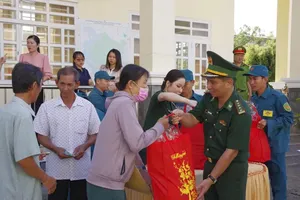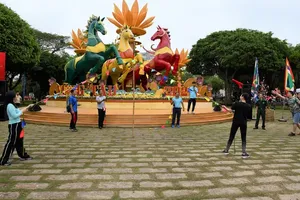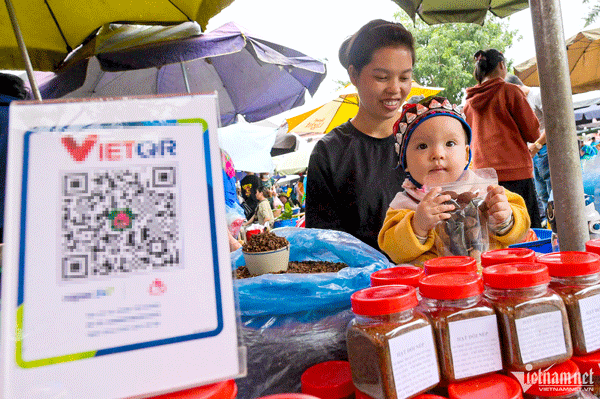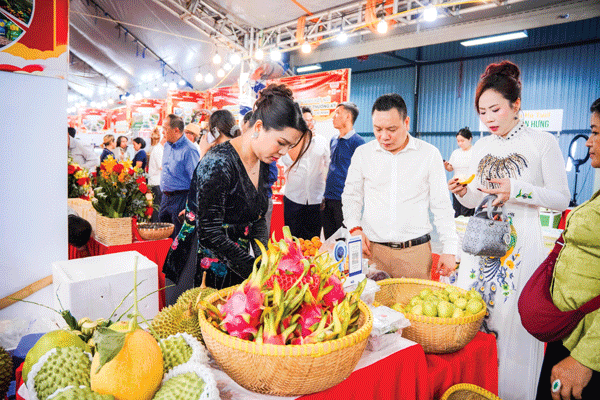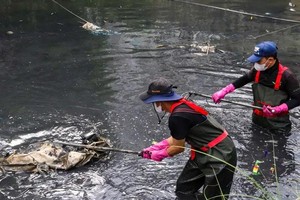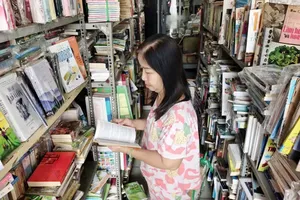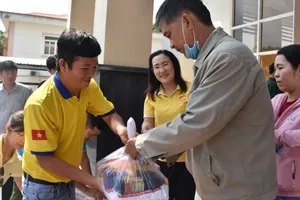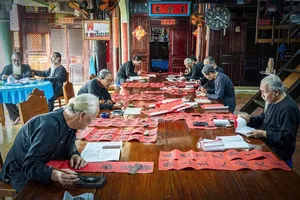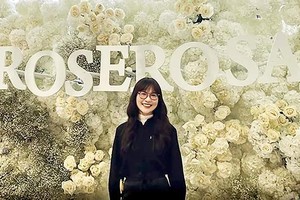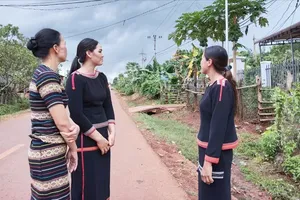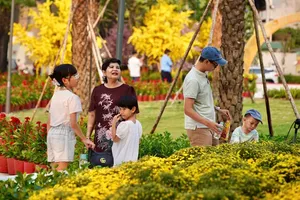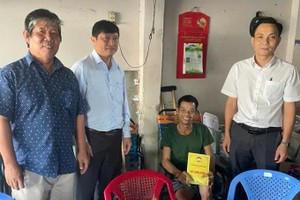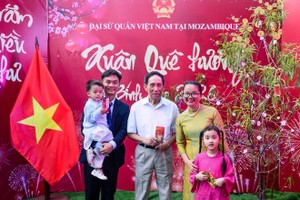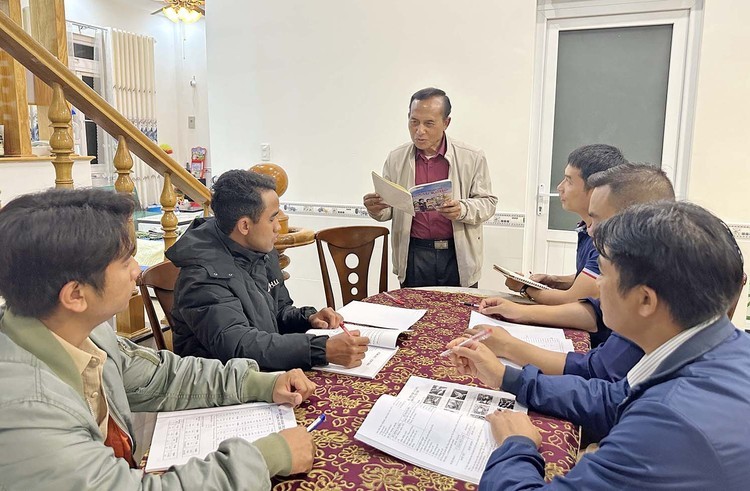 |
A 70-year-old man Pang Ting Uok of the K'Ho ethnic group |
A 70-year-old man Pang Ting Uok of the K'Ho ethnic group is one of them. He worked around the clock to teach the spoken and written language of the K'Ho ethnic group to the next generations.
While welcoming a group of foreign tourists to experience discovery from Bidoup - Nui Ba National Park to Da Blah village, a 38-year-old staff of the People's Committee in Da Nhim Commune of Lam Dong Province’s Lac Duong District Nguyen Thu Binh is enthusiastic to play as a bridge in connecting international friends who expressed their wish to know more about local culture and customs with inhabitants in the village.
Mr. Binh revealed that he can listen and understand a little foreign language; therefore, he listened to what tourists say and then translated it for villagers. Most of the visitors’ questions concentrated on items for daily use, production tools, brocade colors and patterns, or traditional dishes of the K'Ho ethnic minority group. With his knowledge of the K'Ho language, he worked as a translator between foreign visitors and K'Ho inhabitants in the village.
Hailing from the countryside in the Central region, Mr. Nguyen Thu Binh went to Lam Dong Province to study and then stayed here to start his career. Like many people, when taking the exam for civil servants and administrative officers, he chose to study and take the K'Ho language test as a mandatory language. Mr. Binh recalled at first, staff like him while learning the language, had to recognize the letters, then the vowels and consonants. Later, he gradually got used to the letters, he learned more about communication sentences associated with local culture.
Mr. Nguyen Thu Binh is one of many people who was taught by elder teacher Pang Ting Uok when he chose to learn the K'Ho language. He praised the old teacher's enthusiasm and patience which have helped students understand and not be discouraged. As a result, after nearly half a year of studying with the teacher, he can now communicate with native people, said Mr. Nguyen Thu Binh.
Old man Pang Ting Uok is a person who has worked for many years in departments of Lac Duong District and later worked as Deputy Head of the Ethnic Department of Lam Dong Province. In 2005, while implementing the K'Ho language teaching program for officials and civil servants, the Ministry of Education and Training coordinated with the Lam Dong Provincial People's Committee and other departments and agencies to issue a detailed program of teaching materials for the K'Ho language. Since then, old man Pang Ting Uok and a number of colleagues have participated in translating K'Ho into Vietnamese, making K'Ho language teaching materials for classes of civil servants, soldiers, and officials in communes and districts.
Old man Pang Ting Uok said that though he took retirement in 2011, he still has many concerns about preserving and teaching the K'Ho language to the next generations, to officials working in the village and and those who love our culture of the K'Ho ethnic minority group. Therefore, he decided to continue teaching people in the villages and hamlets how to write and how to recognize letters so that they could be the ones to preserve their native writing.
Old teacher Pang Ting Uok and his colleagues’ efforts in teaching the K'Ho language over the past few decades have achieved remarkable results when his students who are officials and employees know how to use the K'Ho language to easily communicate with local villagers; therefore, they have been performing well tasks such as medical care, education, security and order. Moreover, officials and civil servants of state-run organizations and agencies can disseminate the Party's policies and guidelines and encourage dwellers in the village to follow and comply with the State's legal policies. They thus can improve their work efficiency and meet work requirements and tasks.
Old man Pang Ting Uok said that during the time he has been teaching and transforming language to ease students’ learning, he has been participating in edition and supplementing books and learning materials many times to help students more easily expand their vocabulary according to ethnic groups and broaden students’ knowledge about society so that students can access to cultures of the languages students are learning.
Additionally, he and his colleagues have also collected several customs, ancient songs or mottos, proverbs, folk songs, and proverbs, responses from both sides then wrote them down in the K'Ho language to transmit to students the most characteristic features of the indigenous K'Ho group.
For old man Pang Ting Uok, teaching the K'Ho language is both a joy and a responsibility to transmit the language, culture, and good customs of the indigenous K'Ho group to the next generation; thereby, according to him, teaching the language will create unique cultural interference between ethnic groups.
Up to now, even though his hair is gray, old Uok still diligently prepares lesson plans and relentlessly lectures lessons in halls. He even organizes K'Ho language classes at his home in a small alley in the Dang Gia residential quarter in Lac Duong District. Furthermore, he not only teaches the K'Ho language but encourages students in the group to go to schools; as a result, the number of ethnic minority students in the district is gradually increasing whereas the rate of dropouts has decreased. His praiseworthy attempts are particularly worthy of mention as many families have been pouring investment in their children’s studies; so more children in the district have been pursuing higher education and vocational schools.
Realizing that the K'Ho children themselves often only communicate with family members by voice, so he and his colleagues also try to teach the children of the group because the K'Ho language has not been officially taught in high schools, old Pang Ting Uok said.
Deputy Head of the Ethnic Committee of Lam Dong Province Do Woang Ya Guong said that elder senior Pang Ting Uok is not only a teacher and a typical officer, but he is also a person who is rich in the language and culture of his ethnic minority group. He transformed language from a tool and means of communication into a material of love for the people, land and culture of the Central Highlands.
Therefore, in each language lesson at his home or facility, students not only practice listening, speaking, reading, and writing skills but also gain access to new things about ways of thinking, lifestyle, and traditional cultural systems of many classes of people on the plateau. Most of his following generations have also demonstrated some of that knowledge in applying it to practical life.
